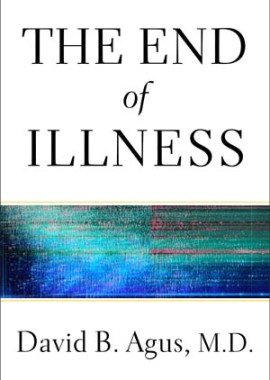The End of Illness, by David B. Agus, MD.
The premise of this book is that the body is a system infinitely more complex than we know or can understand in one look. As a result, the key is to take stock of your current state of health and monitor it for any developments. By engaging yourself in a more intimate understanding of your body you can personalize your healthcare, making the best decisions for you.
I love the idea of this book because it speaks to being more outcome based in our decisions. Like the author, I feel that there are too many generalizations out there about health. We all tend to seek that one form of exercise, one suppliment, or one special diet that is going to transform us – the missing link that has eluded us for so long. Learning to be better informed about the complexities of our bodies and the options at our disposal and monitoring how they affect us is key to health and wellness.
Some of the best points he makes include:
– People should have teams for shared decision making
I personally have two criticisms of the book. Dr. Agus writes that the body is a system too complex to comprehend piecemeal and about the need for creating a whole picture. At the same time, however, he delves into a lot of details about very specific topics. He writes at length about Vitamin D, Statins, DNA, inflammation, and more. This analysis gets a bit complex and requires a lot of access to good research to duplicate should you wish to follow his lead. This only feeds into the second problem which is that he is demanding, in my opion, an awful lot of the average person. He has lengthy questionnaires involving a lot of self monitoring and on-going revision. He also recommends genetic screening to identify your individual risk factors for certain diseases and then using that information to tailor your lifestyle accordingly.
As I made my way through what became a sometimes dense analysis of these various topics I found myself asking the question that I posed in a previous post: is this the most important improvement I can make? Most people have some glaringly bad habits. This could be addresssed much more simply than having a genetic screening or subscribing to various medical and scientific journals. For example: How is your diet? Are you eating out regularly rather than preparing your own food? Are you skipping meals? Too much alcohol? How many times a week do you exercise, if at all? How much sleep are you getting? Asking these questions and then, much more importantly, actually doing something about them would go a long way to improving most people’s health. I would push for that long before I asked someone to familiarize themselves with all the available research on vitamin D or to make the investment in genetic screening. To be fair, he does speak to these points in his book, but they get burried along the way in a somewhat lengthy analysis about the things he has learned during his career as a cancer specialist.
